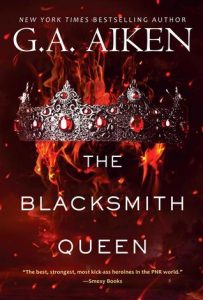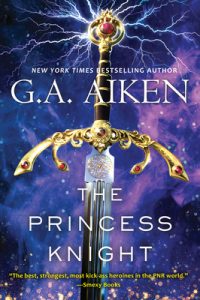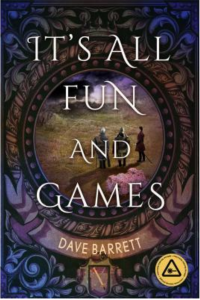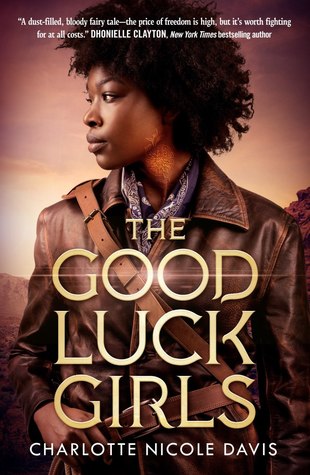I received a copy of G.A. Aiken‘s The Princess Knight through Bookish First. However, I didn’t initially realize that it is book two in The Scarred Earth Saga. So, I borrowed book one (The Blacksmith Queen) from the library before reading it. Here are both of my reviews.
 Description of The Blacksmith Queen:
Description of The Blacksmith Queen:
When a prophesy brings war to the Land of the Black Hills, Keeley Smythe must join forces with a clan of mountain warriors who are really centaurs in a thrilling new fantasy romance series from New York Times bestselling author G.A. Aiken.
The Old King Is Dead
With the demise of the Old King, there’s a prophesy that a queen will ascend to the throne of the Black Hills. Bad news for the king’s sons, who are prepared to defend their birthright against all comers. But for blacksmith Keeley Smythe, war is great for business. Until it looks like the chosen queen will be Beatrix, her younger sister. Now it’s all Keeley can do to protect her family from the enraged royals.
Luckily, Keeley doesn’t have to fight alone. Because thundering to her aid comes a clan of kilt-wearing mountain warriors called the Amichai. Not the most socially adept group, but soldiers have never bothered Keeley, and rough, gruff Caid, actually seems to respect her. A good thing because the fierce warrior will be by her side for a much longer ride than any prophesy ever envisioned …
Review:
To my utter and complete surprise, I loved this. I did quibble a little with the running fat joke, but I appreciated that Keeley didn’t match the beauty ideals of society and was still shown as confident and desired, worthy of love. And I laughed a lot. The book is hilarious, utterly ridiculous, but in a good way.
I did think some of the cursing felt anachronistic at times. Don’t get me wrong. Fuck is my favorite curse word and I utter WTF, probably, an average of once a day. So, I don’t have any problem with the cursing itself. It’s just that on occasion you’d be in a fantasy realm with two moon, centaurs, elves, and dwarfs, and then some thoroughly modern-world curse or phrase would drop like a clanger.
All in all, however, I have book two and I absolutely can’t wait to start it.
 Description of The Princess Knight:
Description of The Princess Knight:
LONG LIVE THE QUEEN
Gemma Smythe dedicated her life to the glory of battle. With her fellow War Monks, she worshipped the war gods, rained destruction on her enemies, and raised the dead when the fancy took her. Until her sister Keeley became the prophesied Blacksmith Queen, and Gemma broke faith with her order to journey to the Amichai Mountain and fight by Keeley’s side.
The Amichai warriors are an unruly, never-to-be-tamed lot, especially their leader-in-waiting, Quinn. But when the War Monks declare support for Gemma’s ruthless younger sister Beatrix, the immaturity of her key ally is the least of Gemma’s problems. She has to get to the grand masters, dispel their grudge against her, and persuade them to fight for Keeley and justice. If her conviction can’t sway them, perhaps Quinn’s irritating, irreverent, clearly unhinged, ferocity will win the day . . .
Review:
I really enjoyed this. Admittedly, not quite as much as I did the first one. I think it sometimes took its slapstick ridiculousness a tad too far. But overall it was a real winner. I like that there wasn’t really any angst in the romantic subplot, the underlying theme of acceptance, and the humor. But mostly I just love the varieties of crazy in all of the characters and how they all come together as a whole in the end.
Death is treated awfully lightly though. Some of the main characters, ones that the reader is meant to sympathize with, slaughter others fairly indiscriminately, and one is to understand innocents are among those caught in the fray. I found that a little hard to overlook.
All in all, however, I’ll be eagerly awaiting a third book. There is going to be another, isn’t there? And maybe a fourth and fifth and sixth? A girl can hope.

